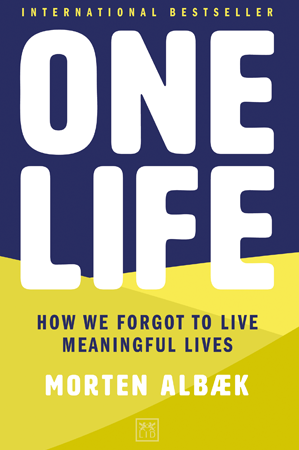‘One Life’ is an exploration of just what it is about the modern way of life (and working life in particular) that is making many of us unhappy, unfulfilled and suffering from poor mental health. The author ranges across philosophy, psychology and research to try and answer this pressing question.
Chapter Three is very relevant to HR practitioners, providing a robust criticism of those familiar features of working life and their impacts upon our wellbeing. From the
constant measurement of individuals through performance assessment, personality questionnaires and annuals appraisals we are constantly measuring ourselves, yet in terms that say little about what really matters in life. The book also considers the impact on wellbeing of poor line management capability, and whether we focus managers on the right things – for example, the wellbeing of people and finding meaning in our work rather than productivity levels.
The author also singles out the term ‘Human Resource Management’ for particular criticism, focusing as it does on the categorisation of people as resources to be administered, something he considers ‘dehumanising’. This is an argument that many HR practitioners will already be familiar with.
The author saves his primary arguments against the idea of work life balance, which he considers a damaging idea; that it encourages us to split ourselves into two, compartmentalising these different parts of who we are We can see this in the fact that many of us focus on getting through the week to enjoy two days of work free weekend. For those of us that lack meaning in our work, or find it unsatisfying or a cause of ill-health, the idea of work life balance leads to us seeing work as the bad part of our lives and that all happiness and satisfaction needing to come from somewhere else. Instead of splitting ourselves in two the answer lies elsewhere: in more meaningful leadership, reducing the divide
between work and the rest of life, and finding more meaningful work, even if that means giving up high salaries and company perks. The central idea of the book is summed up by
its title. We have one life, and we must find a way to live it well and integrate the different aspects of who we are.
The book presents some interesting and challenging ideas. It provides a compelling narrative to explain some of what is problematic about some of the ways that we work and how we live our lives, and what we see as ‘normal’. It does however feel somewhat short on what any of us as individuals might actually do about it should we identify our own self in the narrative. The book argues that we should spend less time on work that is meaningless or that on our deathbed we would regret our time undertaking it. This is a noble idea. It is perhaps however, an ideal beyond many workers today who are trying to simply survive zero-hours contracts, precarious employment, low pay and in-work poverty.
Gemma Dale, Founder, The Work Consultancy
Published by LID







